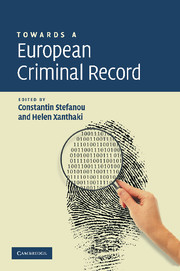19 - Conclusions
Published online by Cambridge University Press: 13 July 2009
Summary
Recent developments
This book has examined in detail the proposal for the ECR and the conditions for its reception by the national legal orders of the Member States. The political feasibility of the ECR and its legitimacy from the point of view of human rights and civil liberties has also been explored. Recent developments in the area of mutual legal assistance and judicial cooperation in criminal matters have been presented and lessons from parallel relevant initiatives of the EU have been identified.
However, questions on the future of the ECR in legislative and political practice remain. In order to assess the future of the ECR one would have to provide updates on the current position with reference to relevant Commission initiatives. At the moment the Commission's proposal for a register of convictions is set aside. The indifference of Member States' delegations towards a central database, that would only include a mere listing of countries where convictions can be sought, has buried this proposal, hopefully for ever. It is very difficult to explain how the Commission possibly felt that Member States would undertake the expense of a centralised database for so little in exchange.
The ECR as a concept remains, albeit as a second stage solution, which will follow the initiative on the organisation and content of the exchange of information on criminal convictions. Member States find it difficult to subscribe to a central database, even one covering a limited range of crimes. At least at this stage.
- Type
- Chapter
- Information
- Towards a European Criminal Record , pp. 378 - 384Publisher: Cambridge University PressPrint publication year: 2008

